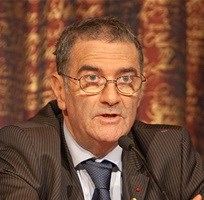
Top stories






More news


Marketing & Media
Ads are coming to AI. Does that really have to be such a bad thing?














South Africans had the opportunity to find about the universe from one of the world's top physics scholars on 30 and 31 October 2013, where students, academics as well as the general public was be able to meet and learn more from the 2012 Nobel Laureate for Physics, Professor Serge Haroche from the Collège de France and Ecole Normale Supérieure, Paris.
Professor Haroche attended the University of the Western Cape (UWC) Science Research Open Day, with two days of interesting lectures and presentations, culminating in the Professor's keynote address, on "Power and Strangeness of the Quantum World."
"If there is one university that understands the power of inspiring students to achieve greatness, then it is the University of the Western Cape," said UWC Vice-Chancellor Brian O'Connell. "This is a university that went from being in trouble and faced with an uncertain future, to becoming a South African research leader, not only in the field of physics, but also in molecular biology and biochemistry."
Professor Haroche's visit is particularly relevant in the light of UWC's driving the first African-led experiment in low-energy nuclear physics at CERN, the European Organisaton for Nuclear Research, one of the world's largest and most respected centres for scientific research. By examining the shape of nuclei that are only a few 10-15m across - a few millionths of a millionth of a millimetre - this experiment will help clarify how the elements are created in massive stellar explosions, and perhaps how safe and sustainable energy can be created.
"We are providing students with the keys to unlock the mysteries of the heavens," says UWC Physics Professor Nico Orce. "The South Africa-CERN collaboration has the potential to put not only UWC but also South Africa on the world map in terms of physics and scientific research. The importance of this in the light of our background of being historically disadvantaged cannot be underestimated. It shows our students that anything can be achieved if you put your mind to it and work hard at realising your dreams."
Professor Orce said that having a Nobel Laureate in Physics coming to UWC for the first time was a very exciting event. "What is important to note here, is that students will be exposed to greatness, and will have the opportunity to speak with Professor Haroche and be motivated to attain great heights in the scientific world."
Professor Haroche was awarded the 2012 Nobel Prize for Physics jointly with David J Wineland for "ground-breaking experimental methods that enable measuring and manipulation of individual quantum systems". According to the official Nobel Prize website, "when it comes to the smallest components of our universe, our usual understanding of how the world works ceases to apply. We have entered the often paradoxical and difficult-to-comprehend realm of quantum physics. In this world, the same object can exist in different states simultaneously."
Quantum theory has allowed physicists to understand in depth the microscopic world, leading to applications (computers, lasers, magnetic resonance imaging, atomic clocks etc.) which have changed the macroscopic world we live in.
Professor Haroche has received many international prizes for his work and will not only talk to students during his visit to South Africa, but also address high school pupils in an unusual outreach programme.
"Believing in themselves is the first step towards achieving personal as well as academic success for many young people, especially those from disadvantaged backgrounds," says Professor Orce.